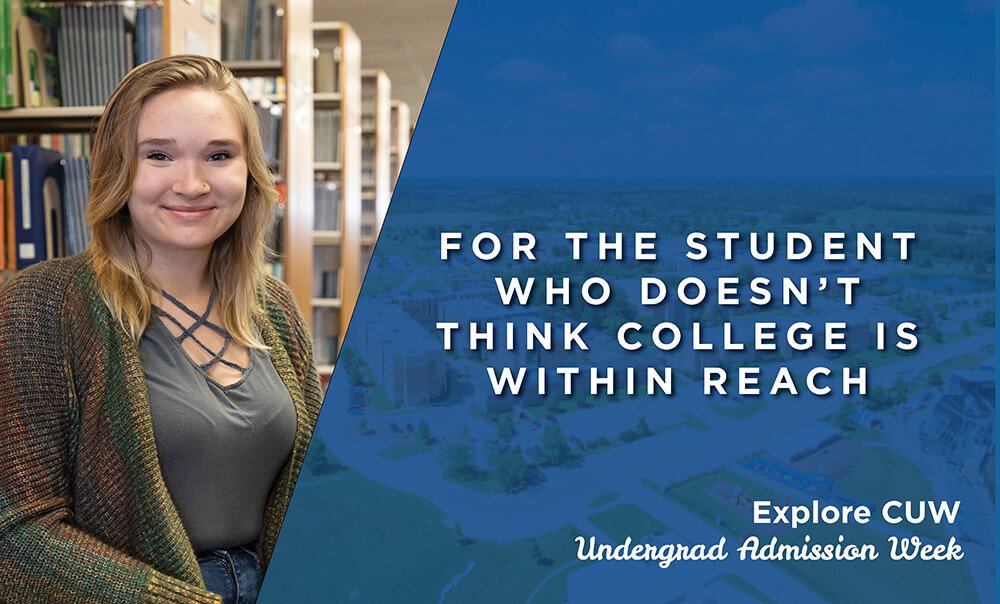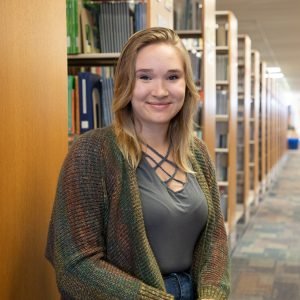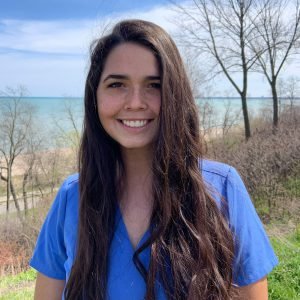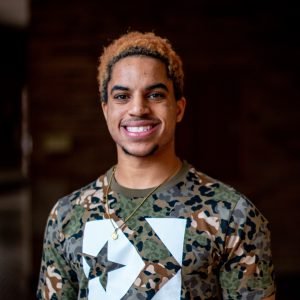
So you’ve graduated high school. You made it to the finish line during one of the most unstable and unpredictable moments in recent history. Now what?
While the world remains pretty unsettled, Concordia wants to lay rest to at least a few of your fears about higher education, especially if you’re someone who thought high school would be your academic conclusion.
Whether the barrier between secondary and post-secondary is financial, academic, or a lack of precedence or familial support, rest assured that high school doesn’t have to be your final destination. In fact, at a time when life is so uncertain, there’s no better time to join a college community that has your back—in more ways than one.
Take it from a few Concordians who were once in your shoes.
FOR THOSE WHO DON’T THINK COLLEGE IS WITHIN REACH…
1) …Because they can’t afford it. Meet Lizzy.

Lizzy Balsiger has had it rough in a lot of ways.
She has a rare group of genetic tissue disorders called Ehlers-Danlos Syndrome. The disease can cause an array of problems including joint hypermobility, long-term pain, chronic fatigue, dizziness, palpitations, and digestive disorders.
The tremendous financial demand of Lizzy’s medical bills has forced Lizzy and her mom below the poverty line time and again. In high school, Lizzy had a flare-up of her EDS that left her wheelchair bound, and doctors predicted she would only get worse from there.
Miraculously, however, Lizzy took a turn for the better her senior year. Throughout it all, her incredibly generous spirit and humble heart never quit. In the midst of her health struggles, Lizzy volunteered in her high school’s special education department and fell in love with the individuals she served there. Soon after, she set her sights on becoming a speech-language pathologist—a career that requires at least a master’s degree, and often a doctorate degree, to be successful in the field.
Lizzy knew that if she was going to attend college, she would need to find the closest school possible—a school that was near her trusted medical team and her mother/support system.
That school happened to be Concordia.
“Instantly I thought of the money,” Lizzy says. “All I’m thinking is private school? Plus my medical bills?! I was just seeing dollar signs.”
Lizzy’s concerns were quickly put to rest, however, when she learned of the financial support package she would receive from Concordia. The Concordia aid was combined with community scholarships and even support from specific families whose special needs children Lizzy served.
Concordia offers dozens of other scholarships, too. In fact, 99 percent of our student body receives financial aid. Just take a look at some of the scholarships and grants we offer.
2) …Because they’re afraid they can’t keep up with the rigor of college academics. Meet Deb.
One of our recent graduates, Deb Gibbs, was a high-achieving student in high school despite a learning disability caused by a severe car accident she endured at age 10. Yet, even Deb admits she struggled with the transition to college-level academics.
“I didn’t know how much it took to be in college,” Deb says. “My freshman year especially, it was just a big learning curve, but Concordia supported me all the way through.”
The expectations at Concordia are high. We don’t let you skate through. In general, Concordia has higher-than-average pass rates on national certification exams.
But we also readily provide ways to help you rise to the occasion, and Deb isn’t the only student who will tell you that. In fact, you could say academic support is kind of our specialty since Concordia’s academic advising model has received global recognition and all.
Highlights of our advising model include:
- PROSPER—For those in need of academic coaching upon entry into the university
- STAR—For those who find themselves on academic probation for one reason or another
- FAST—An academic early alert task force that meets weekly throughout the academic year
On average, students in PROSPER and STAR complete more classes, earn higher GPAs, and are far less likely to remain on academic probation or be academically dismissed than eligible students who don’t engage in the programs. Plus, everything is kept confidential so you don’t ever have to feel singled out.
In addition, Concordia’s Academic Resource Center is available 24/7 through online services, as well as through ample in-person hours.
Beyond that, countless students will attest that Concordia’s small class sizes combined with professors who go above and beyond the call of duty have often made the difference between mediocrity and higher achievement.
“The professors at Concordia, I can honestly say that you wouldn’t be able to find them at a public college,” Deb says. “They help you one on one. I can’t tell you how many times I went into my physics prof’s office and looked through every question on homework and quizzes to try and understand where I went wrong. And he welcomed me in each and every time. He always made time for me.”
3) …Because they don’t have an at-home support system to help them navigate it all. Meet DJ.
Ever since middle school, De’Shawn “DJ” Ford has had his sights set on college—a lofty goal for someone with the types of barriers that are in DJ’s life.
“My mom’s parents were drug addicts and dealers. My dad’s mom died of a heart attack and his father was in jail most of his life,” DJ says. “Neither of my parents went to college. My dad didn’t even graduate from high school. It’s a lineage of struggles.”
DJ is determined to be a trailblazer within his family though. He’s a trailblazer at Concordia, too, as it turns out. He’s among the university’s first Unlimited Potential Scholars. The scholarship program, which is extended exclusively to minority students who have a demonstrated financial need, builds in extra resources and support systems—like pairing Scholars with peer and employee mentors throughout their time at CUW—to ensure that the Scholars succeed.
DJ says his mentor, Director of Multicultural Engagement Walter Goodwyn, went so far as to help him shop for his first suit, which DJ wore to an interview for a coveted RA position. He landed it, by the way. Out of the approximately 120 students who applied this year to be an RA at Concordia, only a quarter of them were accepted.
Even without a formalized mentorship program, the spirit of community and support at Concordia is strong enough to ensure that students aren’t overlooked. That’s definitely been Lizzy Balsiger’s experience and it’s made all the difference for her as she, too, navigates higher education as a first-generation student.
“Some of my classmates whose parents are doctors or healthcare professionals have all these built-in opportunities to shadow people, get career advice, or guidance on classes,” Lizzy says. “It’s different for me, but I’ve come to realize that while I may not have a parent who can help me navigate everything, I have at least eight profs who are ready at a moment’s notice to guide me through anything and everything. The relationships I’ve formed at Concordia are incredible and have made my whole collegiate experience worth it.”
Want in?
Join us throughout this week to learn a little more about Concordia University Wisconsin.
Visit here for a virtual tour. Here to meet the admissions staff and here to enroll. There is still time to register for the fall semester!
— This story is written by Kali Thiel, director of university communications for Concordia University Wisconsin and Ann Arbor. She may be reached at kali.thiel@cuw.edu or 262-243-2149.
If this story has inspired you, why not explore how you can help further Concordia's mission through giving.

